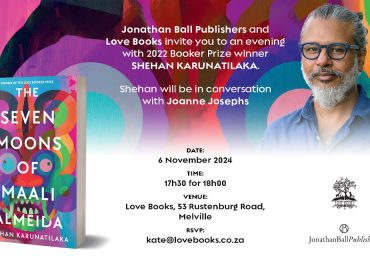Jonathan Ball Publishers has shared an excerpt from So, for the Record: Behind the Headlines in an Era of State Capture by Anton Harber.
The virtual book launch of So, for the Record takes place on Thursday 8 October 2020 at 18:00 SAST.
Harber will be in conversation with Jacques Pauw.
The launch will be streamed live on The Reading List’s Facebook page and YouTube channel.
Read the excerpt:
~~~
Excitement was laced with fear when Branko Brkic of Daily Maverick first told Stefaans Brümmer of amaBhungane that he had the #GuptaLeaks emails. It was the biggest moment of their journalistic lives, and one of the most scary.
Was it vodka or tequila? That was the one point Stefaans Brümmer [of investigative unit amaBhungane] and Branko Brkic [founder of online news site Daily Maverick] couldn’t agree on when they told me about the meeting. Brümmer said that when he heard what Brkic had to tell him, he ordered a shot of vodka. It was lunchtime, but he was off coffee, so a vodka was called for. Brkic is adamant that it was tequila. Who to believe? This account has to be precise, accurate, worthy of the subject matter.
They’d met at Clarke’s Bar and Dining Room in Long Street, Cape Town, Brkic’s regular hang-out. It’s a casual, noisy place with long wooden benches, serving simple fresh food for mostly young clients.
On this day, Brkic had the kind of story to tell Brümmer that journalists dream about, the kind that keeps us going, that justifies those long hauls of gathering information and cultivating sources that we hope one day we might be able to use, that takes us out from behind our computer and puts us in front of the television cameras, that thrusts small websites into the national spotlight, that brings down the powerful – the kind where every detail is seared into our memory. Brkic told Brümmer how Currin had come to him to tell him about the two men who had a windfall of potentially valuable information in their hands. It was massive, Brkic said; there were thousands and thousands of emails from the heart of the Gupta empire.
This story is bigger than me, it’s bigger than us, it’s bigger than all of us, he said. Brkic had only had a quick look at the sample material, but he wasn’t a man for understatement. He was a man of enthusiasm and energy, of passion for a great story. I don’t have the people and skills to handle it, he said. We need to work together on this.
Brümmer, ever-cautious, insisted they talk first about security measures. They would never discuss the matter on the phone – only in face-to-face meetings. The sources should probably be taken out of the country and given what was needed to start a new life. That would take a lot of money. Could they find that money?
Brkic thought he had the person who would back them, a superwealthy businesswoman who wrote an occasional column for him, usually a fierce attack on corruption and bad governance.
They discussed putting a team together to work on the material. But if it got out that they were working on something big, they would be vulnerable to a raid or theft or malicious disruption of some sort. They had to get a copy of the material out of the country.
But the journalists would still be vulnerable. Maybe they had to work out of the country, in a neutral place where South African security agents or the Guptas’ goons couldn’t get to them easily. But even if they did this, once they started publishing, steps could be taken to
stop them, to keep the revelations out of the public eye, or to discredit them or the material.
Did anyone already know about this? Were they already in danger? Brümmer’s mind was racing. Were they being set up? Who were these whistleblowers and how could the reporters know if they were genuine? Did they need to meet them themselves?
Be careful. Be careful.
The data would have to be assessed and authenticated. How would they do that? If it held up under scrutiny, they would need to drop the other stuff they were working on and throw everything at this, Brümmer thought.
It would take a while, and many discussions, but they realised they had to get their team and the material to a safe place. And they couldn’t rush it. They had to get it right and maximise the impact. As exciting as it was, patience was required. Once it was all written and ready, and they started releasing it, they couldn’t be stopped.
They set up a protocol to continue the discussion. If they needed to talk, they would include a panda emoji in a message. Thirty minutes later they would meet in a Cape Town park, leaving their cellphones in the office, and take a stroll.
Brümmer had been an investigative journalist for around twenty years, and had broken many big stories. But this was of another order. The importance of the story and the possibility of inside information made this potentially a once-in-a-lifetime breakthrough. His heart was pumping.
So Brümmer ordered a shot, and downed it.
Brkic got a sample of the material on a memory stick just before the 2017 Easter weekend and arranged drop it off with Brümmer, for him to look at the contents. Brümmer waited up for Brkic. He came after midnight. ‘Let me know what you think,’ he said.
Brümmer sat through the night going through the sample. The most striking thing about the material was its size: nobody could have created such a database from scratch; making such a vast trove look and sound authentic would take years of work.
Brümmer recalled a fake-email spy scandal of a few years previously, when a bunch of emails had surfaced that cast suspicion on key people in ANC circles who’d appeared to be plotting against the party leadership. Because the emails played into political suspicions of the time, many people – even intelligent people – fell for them, but a closer look had raised doubts. The people who’d supposedly written the emails had misspelt their own names and titles, and used language they wouldn’t normally use. The emails had been fabricated.
There was one big difference, though. Those emails had come as printouts, so the dates, format and other metadata couldn’t be checked. This lot came as raw data, so they would be able to check whether the metadata was consistent and what changes had been made.
The metadata is the information that sits in the background of every digital document: its identity, structure, context and other administrative information. It reveals when and on what computer the document was created, what type of document it is, and if and when it was amended. In a trove of emails, the metadata would include information such as the date the emails were sent, who sent them and the subject matter. So if you access the metadata, you can learn a great deal about a document, and this is where Brümmer would need to go to authenticate the material.
But he had only a sample of the emails, and he couldn’t do this most important check until he had it all. Also, even if this stash of emails was too large to have been totally manufactured, someone might have taken an existing trove of emails and inserted fakes among them. That was classic spycraft: planting fake material among authentic stuff. (Later, they would bring in an expert to check the metadata, and it would show that the emails had all been created in sequence, which was hard to fake.)
Brümmer’s main task at this stage was to see if the information matched what he’d learnt from years of research into the Guptas. Did the characters, the events and the narratives tally with what he knew? Were they real? By the time the sun came up on Good Friday, he was confident that the material was genuine and that it was rich with Gupta insider information.
He sent Brkic their agreed signal: a smiley-face emoji.
~~~





